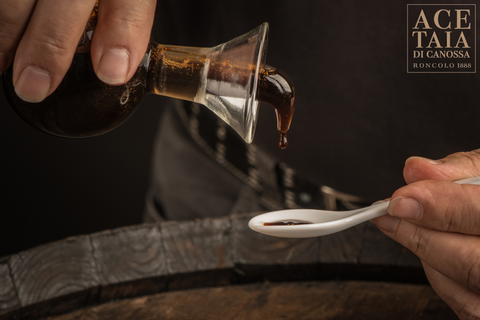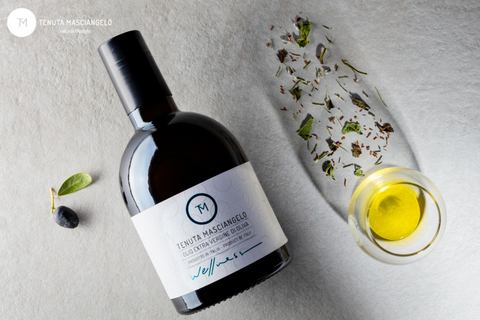From Venturini Baldini, a historic producer in Reggio Emilia, pure drops of magnificent Aceto Balsamico, the Italian purple gold.
One of the oldest and largest vinegar cellars
This exceptional balsamic vinegar is produced by Venturini Baldini, a historical winery founded in 1976 on Parma and Reggio Emilia's spectacular hills. The historic estate – a 130-hectare property - was one of the first to achieve the "organic certification" in the region. Venturini Baldini, indeed, is the proud custodian of one of the oldest and largest vinegar cellars ("acetaia" in Italian) in the area, with more than 400 barrels made of different woods. These precious wooden barrels are the true secret of the finest balsamic vinegar in the world. Here, the cooked grape turns into Traditional Balsamic Vinegar. Today Venturini Baldini is a leading producer of premium organic Traditional Balsamic Vinegar of Reggio Emilia.
In every drop, taste the flavor of an ancient tradition
Acetaia di Canossa – inside Tenuta di Roncolo - produces high-end Aceto Balsamico Tradizionale DOP di Reggio Emilia (aged a minimum of 12 years, up to more than 25 years). Produced from grape must, this purple gold is overseen by Consorzio di Reggio Emilia, which guarantees the production process's authenticity. Another highlight is Aceto balsamico di Modena (certificate IGP - IGP BIO), an outstandingly fine vinegar produced from Emilia Romagna grapes and must. This balsamic dressing reposes in special wooden barrels.
A tribute to a charming noblewoman
Acetaia di Canossa in Italy is synonymous with tradition, extreme quality, but also fascinating history. The name, indeed, is a tribute to Matilde di Canossa, vice-queen of Italy who lived in these very lands. Called La Gran Contessa di Toscana ("the Great Countess of Tuscany"), she was one of Italy's most powerful aristocrats in the second half of the 11th century. In 1046 Emperor Henry III stopped in Piacenza en route to Rome for his coronation. He wrote to Boniface, Matilde's father and Lord of the Castle of Canossa, and asked for some of the unique vinegar that "he had heard was made to perfection" in the fortress. According to the scholars, Henry III was enormously pleased with the magnificent gift. Today Acetaia di Canossa continues this ancient ritual, respecting its timeless tradition. But the past alone is not enough; that's why they need to continue research and innovation. At the same time, Acetaia di Canossa prides itself on being innovative and modern to allow this product of excellence to continue to be an Italian pride in the world.



